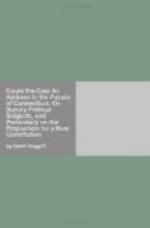Another project is that of universal suffrage. The streets resound with the clamour that men are deprived of the invaluable privilege of choosing their rulers, and the people are invited to extend this privilege to all who pay taxes and do military duty. It is now discovered that Connecticut, in this particular, is not free.—The great argument urged in support of universal suffrage is that taxation and representation should go hand in hand—it is said that this maxim was deemed just during the revolutionary war, and that Americans adhered to it as a fundamental principle.—This principle the writer readily recognizes as a sound and indisputable position in every free government. But what is the meaning of the maxim? Does it intend that every person who is taxed, can of right claim the privilege of giving his suffrage? If so persons convicted of offences, or who are infamous for their vices may vote—for such persons are not outlawed.—On this principle, women of full age and unmarried, are also to be admitted.— Minors also whose property is taxed, should be permitted to exercise this franchise, at least by guardian or proxy. What then is the true meaning of the maxim, that representation and taxation are inseparable? Here all writers agree—it means that no community should be taxed by the legislature unless that community is, or might have been represented in such legislature.—Hence several towns in this State till lately, were not represented in the General Assembly, and of course not taxed.— Barkhempsted, Colebrook, and Winchester, it is believed, were of this description.
This State and the other States understood this maxim precisely as now explained, in their opposition to Great-Britain.—We complained that the colonies should not be taxed because they were not represented in parliament. In this view of the subject the maxim is wise and just.
Again, is not every town in Connecticut now represented in the legislature, and of course each individual equally with every other? In the representative of Hartford, for example, a representative of the freemen of Hartford, or of the town of Hartford? The truth is, every man, woman and child are represented.
But it is said that many persons are excluded from giving their suffrages who have life, liberty and reputation to protect. On a close attention to this fact it will be found that the number of those worthy members of society who do not possess the legal qualification, is small, and if men are to have an influence in elections according to the amount of their taxes, why should not the man who pays fifty dollars, be entitled to more than one vote? No one pleads for such a privilege, but there are many who insist that the man without a cent of property shall have the same direction in the choice of those who are charged with the interests of the community, as he who is worth thousands of dollars. A friend to the rights of man seems to feel no alarm at the




